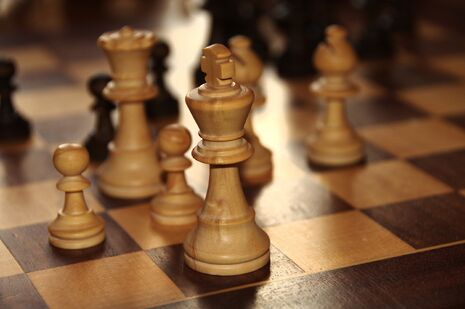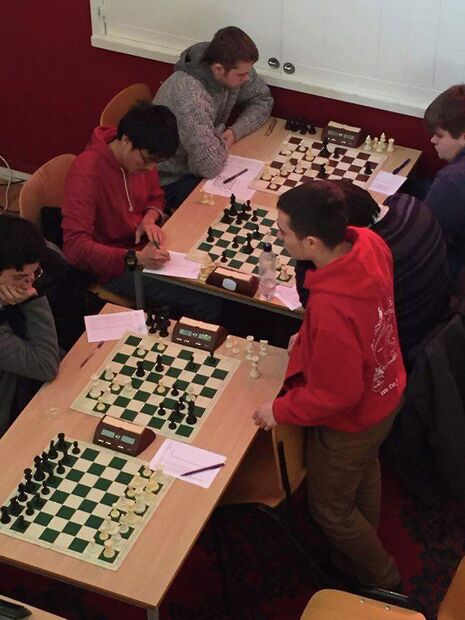Rogue Sport of The Week: Chess with Kane Toh
Paul Hyland checks out out the world of Cambridge chess with pawn star Kane Toh
Athlete Profile
- Name: Kane Toh
- College: Fitzwilliam
- Degree: Bio NatSci
- Hometown: Johor, Malaysia

Kane Toh is a chess king. A club-level player who's represented Cambridge in the Freshers' Varsity and Seconds' Varsity, he's also played in the 4 Nations Chess League and the British Universities Chess Championships since his arrival here in Cambridge.
Like most successful players of the sport, Kane first picked up a chessboard as a child, and it was his competitive streak that kept him coming back for more. Now as he prepares to represent Cambridge at the BUCA championship this weekend, the president of the Cambridge University Chess Club gives us his defence of a game everyone can get involved in, from rookie to Grandmaster.
Do you think chess can be considered a sport?
Absolutely, if we're willing to put aside the arbitrary preconception that all sports necessarily involve running. Contrary to popular thinking, chess is physically demanding: thinking for 6-7 hours per game is no mean feat. Chess players do need to keep in shape, and one advantage younger players have against older players, like all sports, is their greater physical and mental stamina. Not to mention, chess is competitive, popular and has already been recognised as a sport by many countries.
How did you get into it?
I was a sore loser as a kid, and I still am. My dad bought me a chess set from a supermarket to have the satisfaction of beating me. A little knowledge is an unfortunate thing. I couldn’t accept my defeat, and credit goes to my dad for being perceptive, as he sensed my thirst for winning and fed me books from the local library.
Then I joined some local competitions and experienced the thrill of winning my first few competitive games. I also struggled to cope with my losses, and it really taught me how to recover from defeat and to persevere and learn from my mistakes.
What’s the hardest thing about chess?
Coping with my countless ego-crushing losses to kids who can barely reach the chess pieces because they are too small.
How long do you need to practice to be good at chess?
It depends on how ‘good’ you want to be, when you start playing seriously, the resources you have, and your talent. I think a year of training, about 3-4 hours every day would get most people close to expert level.
If you want to be a chess master, unfortunately, it only gets tougher. A chess Grandmaster (GM) title, the highest official title awarded only to the strongest players, may be given to a 14 year old prodigy, but some people try their entire lives and fail to achieve it. As ever, life’s unfair.
How do you feel about increased coverage of chess? Magnus Carlsen’s recent World Championship win was very widely reported, for example.

I think it has been excellent. Karjakin, the Russian challenger, gave a good fight, and I guess the protracted nature of the competition, extending into the rapid-play section, gave the games more coverage.
Also, it was a relief that the company Agon, in its bid to monopolise the transmission of chess moves in tournaments for protection of its commercial interests, lost the lawsuit against chess24, an online internet chess server that provides live broadcasts for free. Otherwise, I feared that it would be a source of disenchantment amongst chess enthusiasts, and certainly, it would give the sport negative publicity.
Also, as a side note, it is interesting that chess is being featured in Hollywood more frequently recently. The movie Pawn Sacrifice is an obvious example, but it depicted chess players as a rather peculiar bunch. I am not sure how I feel about that, but as an avid chess fan, I am obviously pleased that chess is getting more popular recently.
What’s the state of the sport in Cambridge?
I think at this stage, it is safe to say that amongst the British Universities, Cambridge is one of the strongest. For instance, last year, we won the British Universities Chess Championships (BUCA) and placed 5th in the Men’s category in the European Universities Championships.
But I think we could do better to encourage beginners to participate. To this end, we have coaching sessions exclusively for beginners, taught by my teammate Marius Latinis and me, once fortnightly. The regular Saturday club sessions are excellent for weaker players to pit their skills against stronger players and to receive guidance from them. The best way to improve in chess, I think, is to get solid advice from players stronger than yourself.
There are many competitions: a few are held by the club such as the upcoming Blitz Club Championship, a Town vs Gown in Easter against the local Cambridge Chess Club, and many externally organised tournaments like the 4 Nations Chess League, BUCA and the Varsity Matches. We are currently holding the college chess league, which gives Cambridge students of all strengths an opportunity to play against other college representatives in a series of friendly games.
What do you make of MPs' proposals in 2014 to introduce chess into the school curriculum?
I am glad that it was raised. Armenia has already implemented this since 2011 in their primary school curriculum, and it has since been received warmly from the public. So we have some precedents to follow. Personally, even if there was no such proposal, I would advise all parents to expose their children to the game. While I think the evidence linking chess to higher intelligence or improvements in maths and science are still admittedly provisional, from my brief experience as a chess coach to school children, I think chess contributes positively to their learning as it certainly builds character. It teaches kids to be gracious in their victories, and to bounce back from their losses. Humility and perseverance are character traits useful in our studies, and of course, in our daily lives too.
How often do you practise?
I am a chess amateur and I try to put in at least 30 minutes on a regular Cambridge weekday and sometimes more during the weekends. Of course, I attend the weekly Cambridge University Chess Club sessions too to play against the club members.
How do you reconcile it with Cambridge?
Just like how I reconcile with everything else - I just do it in between my studies because I think it’s important.
How easy is it for people to get involved?
I think chess is one of the easiest games to pick up. It has a wide outreach. In The Queen of Katwe we see the transformative potential of chess in children from poor communities. It is easy to learn the rules, and it's a good mental workout and an antidote to boredom. It's full of good, friendly banter and trash-talking, plus it's a great way to make (or lose) some friends!
If you are interested at all to play chess in Cambridge, we hold chess sessions every Saturday afternoon. People interested in getting involved can check out our website and Facebook page for more details. Or people can feel free to drop me an email at if they have any questions.
This interview has been edited for length and clarity
 News / Uni Scout and Guide Club affirms trans inclusion 12 December 2025
News / Uni Scout and Guide Club affirms trans inclusion 12 December 2025 News / Pembroke to convert listed office building into accom9 December 2025
News / Pembroke to convert listed office building into accom9 December 2025 Features / Searching for community in queer Cambridge10 December 2025
Features / Searching for community in queer Cambridge10 December 2025 News / Uni redundancy consultation ‘falls short of legal duties’, unions say6 December 2025
News / Uni redundancy consultation ‘falls short of legal duties’, unions say6 December 2025 News / Gov declares £31m bus investment for Cambridge8 December 2025
News / Gov declares £31m bus investment for Cambridge8 December 2025








